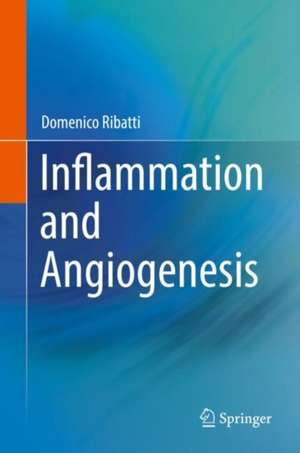Inflammation and Angiogenesis
Autor Domenico Ribattien Limba Engleză Hardback – 22 noi 2017
| Toate formatele și edițiile | Preț | Express |
|---|---|---|
| Paperback (1) | 647.47 lei 38-44 zile | |
| Springer International Publishing – 9 sep 2018 | 647.47 lei 38-44 zile | |
| Hardback (1) | 712.25 lei 3-5 săpt. | |
| Springer International Publishing – 22 noi 2017 | 712.25 lei 3-5 săpt. |
Preț: 712.25 lei
Preț vechi: 749.73 lei
-5% Nou
Puncte Express: 1068
Preț estimativ în valută:
136.31€ • 141.78$ • 112.53£
136.31€ • 141.78$ • 112.53£
Carte disponibilă
Livrare economică 24 martie-07 aprilie
Preluare comenzi: 021 569.72.76
Specificații
ISBN-13: 9783319684475
ISBN-10: 3319684477
Pagini: 113
Ilustrații: VIII, 111 p. 36 illus., 24 illus. in color.
Dimensiuni: 155 x 235 mm
Greutate: 0.33 kg
Ediția:1st ed. 2017
Editura: Springer International Publishing
Colecția Springer
Locul publicării:Cham, Switzerland
ISBN-10: 3319684477
Pagini: 113
Ilustrații: VIII, 111 p. 36 illus., 24 illus. in color.
Dimensiuni: 155 x 235 mm
Greutate: 0.33 kg
Ediția:1st ed. 2017
Editura: Springer International Publishing
Colecția Springer
Locul publicării:Cham, Switzerland
Cuprins
Preface.- Introduction.- The importance of microenvironment in tumor metastases.- Immune cells.- Lymphocyte homing.- Inflammation and cancer.- Inflammation and angiogenesis.- The contribution of immune cells to angiogenesis in inflammation and tumor growth.- Conclusions.- References.- Index.
Textul de pe ultima copertă
This book is focused on the analysis of the role played by immune cell components in the angiogenic process associated with inflammation and tumor growth. Both innate and adaptive immune cells are involved in the mechanisms of endothelial cell proliferation, migration and activation, through the production and release of a large spectrum of pro-angiogenic mediators. These may create the specific microenvironment that favors an increased rate of tissue vascularization. The link between chronic inflammation and tumorigenesis was first proposed by Rudolf Virchow in 1863 after the observation that infiltrating leukocytes are a hallmark of tumors and first established a causative connection between the lymph reticular infiltrate at sites of chronic inflammation and the development of cancer. Tumors were described as wounds that never heal and surgeons have long described the tendency of tumors to recur in healing resection margin and it has been reported that wound healing environment provides an opportunistic matrix for tumor growth. As angiogenesis is the result of a net balance between the activities exerted by positive and negative regulators, this book will also provide information on some anti-angiogenic properties of immune cells that may be utilized for a potential pharmacological use as anti-angiogenic agents in inflammation as well as in cancer. The work is written for researchers in the field and also for graduate students which approach this matter.
Caracteristici
Inflammatory infiltrate is a hallmark of tumors and chronic inflammatory processes Inflammatory cells are able to secrete a large array of angiogenic molecules Anti-angiogenic properties of immune cells may be utilized for a potential pharmacological use as anti-angiogenic agents in inflammation as well as in cancer
